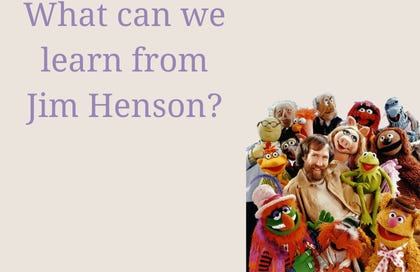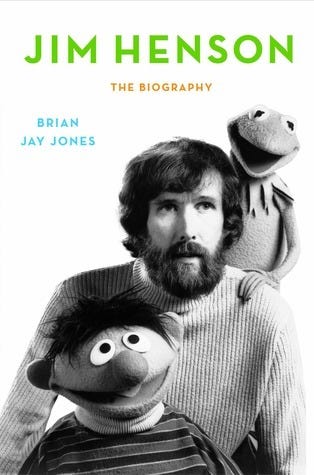Yes, I mean that Muppet guy. Jim Henson is one of my greatest inspirations: his boundless creativity, tireless work ethic, and joyful sense of play never fail to motivate me. I return to Brian Jay Jones’s biography of his life pretty much every year, and each time, I come away with something new and a fresh feeling of purpose.
Today is the 35th anniversary of Jim Henson’s passing, and in honour of his legacy, I’m sharing some of the creative lessons I’ve learned from his extraordinary life and career.
Most of the below is from the biography and I’m kind of going on memory, so if some information ends up being incorrect, I apologise.
Hard work pays off
Jim was one of those people who believed in his dreams and stuck to them. He’d wanted to create a puppet variety show for years, and it took on several different forms and countless studio rejections before it was finally backed by Lew Grade of ATV Studios. The Muppet Show went on to show in over 100 countries, attracted millions of viewers every week, and won multiple awards. His gut feeling was to trust in his work and ultimately it paid off.
It’s okay to fail
With all that being said, it’s easy to think success came effortlessly to Jim, but it didn’t. He had plenty of ideas that weren’t picked up, viable, or even liked by producers and sponsors, including a nightclub, a Broadway show, and countless sketch and television shows. In between the successes, he was met with failures. Even his movies like The Dark Crystal (a personal fave, and so far I’m the only one I know who wasn’t traumatised by the Skeksis as a kid) and Labyrinth were considered flops on their initial releases, and Labyrinth in particular grossed at only half its production costs.
Collaborate
Jim rarely worked on his own. Of course, making television shows and movies takes an entire team, but every time Jim began on a new project, there was always someone else involved in the development, someone else who inspired him, like Brian Froud on The Dark Crystal and Labyrinth, or Joan Ganz Cooney on Sesame Street.
Sometimes I find it hard to work with others, especially on a project I have an emotional connection with, but when I re-listen to the biography, I’m reminded of how beautiful forming connections with others are, especially if you work on something creative and wonderful together.
Rest is important
I didn’t get this one my first time around the biography (but that’s the beauty of books, isn’t it - picking up different things as they relate to the context of your current situation?) and it’s still a bit controversial, but at the time Jim fell sick, he was in the middle of stressful negotiations with Disney (selling his company to them).
During my reread in 2023, I was going through a mental and emotional burnout that affected my physical health. It could have been a coincidence, but I think it’s an actual thing that burnout can make you sick. Maybe this is what happened to Jim, and maybe not. Either way, rest up before the burnout takes over, friends.
Try new things
Jim wasn’t too precious about his projects - once one was completed, he was already onto the next thing, always looking to better his craft with what he’d learned. Everything was exciting, especially when it came to new developments in the film and puppetry industries. To me, it’s a reminder to branch out into different forms or try a new hobby all together. You never know where it will lead.
Nothing is ever wasted
Jim had so many ideas, and while he pitched or developed several, not all of them saw success. But nothing was ever wasted, as ideas or characters were often reused for new projects and many did actually end up seeing the light of day.
As a writer, I obviously have a lot of things that get left on the cutting room floor. I usually try and recycle names, ideas, and characters that had to be edited out, but even if I don’t, the practice I had in creating those things in the first place could never be called wasted time.
Time is limited
Jim was highly aware that we don’t have much time on Earth. The biography positions Jim’s awareness of his limited time as being influenced by losing his brother John when he was 20 (John was 24). Not in a desperate way, but just a fresh awareness that we all have limited time here and we probably won’t get to everything we ever want to do. I try to remember this when I’m tempted to scroll on my phone instead of write (I know there’s a few of you who might relate to that.) We have so many ideas, such limited time - we’ve got to grab the moments while we can.
Love your work and have fun
Jim genuinely loved what he did. Work was fun for him. And it reminds me that our creative lives are such a gift, that sitting down to write (or paint or crochet or whatever your craft is) is a wonderful thing that we should cherish, even if it feels hard at times. Jim had a sense of wonder and fun in everything he did. His own work brought him joy. And if it’s not bringing us joy, what’s the point?







That's a nice review of Jim's life, Bianca. Thanks.
And congratulations on your first book!
Andrew